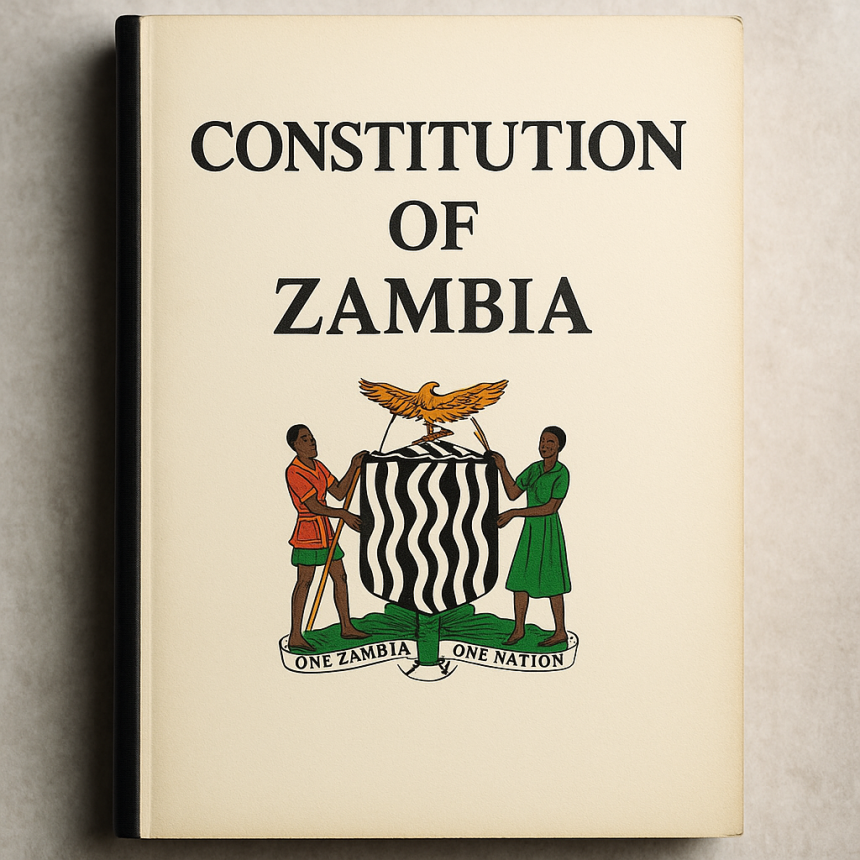BY BRIAN MATAMBO – LUSAKA, ZAMBIA
Zambia is being pushed into a rushed constitutional process at the exact moment when politics is at its most heated. That never ends well. Bill 7 has become the latest battleground. If we want a people-driven constitution that stands the test of time, the amendments should be undertaken after the 2026 elections, with a fresh mandate and a calm national mood.
HOW WE GOT HERE
Bill 7 did not appear in a vacuum. It follows years of constitutional tug of war. Zambians remember the bruising fight over Bill 10, the missed opportunities, and the lesson that constitutions cannot be negotiated like party manifestos. Bill 7 reprises that mistake. It arrived amid accusations of short consultation windows, selective invitations, and a timetable that looks designed to beat the political clock, not to build consensus.
The State House press release naming a large technical committee is meant to project inclusivity. Yet form is not substance. The critical questions remain. Who set the brief. Who controls the pen. What happens to dissenting views. What is the safeguard against partisan clauses being smuggled into permanent law. When the referee appears rushed, citizens will conclude the match is fixed.
WHAT BILL 7 SEEKS, AND WHY THE PUSHBACK
From the outset, Bill 7 has been marketed as a clean up exercise, a technical fix, a limited set of corrections. In reality, even so-called technical tinkering can tilt the entire balance of power. Electoral rules, the structure of Parliament, appointment powers, devolution, the Bill of Rights, and the independence of oversight institutions are not housekeeping. They are the rails on which our democracy runs. Change the gauge, and you change the destination.
The pushback comes from three places. First, process. Zambians want broad, even handed, and verifiable participation, not curated town halls. Second, timing. Reform during an election cycle raises the specter of advantage seeking. Third, trust. Public trust is low when arrests, selective prosecutions, and media intimidation shadow the politics of the day. Under such conditions, even good clauses will be viewed as power grabs.
THE CORE PRINCIPLE: MANDATES FIRST, AMENDMENTS AFTER
Constitutions need oxygen, not adrenaline. The country should pause Bill 7 and commit to a post-election process. Here is why.
1. Legitimacy. A constitution gains authority when it is made after, not before, voters renew or withdraw mandates. After 2026, the winner will claim a clear mandate, the loser will regroup, and both will accept that the people have spoken. That is the climate for rules that bind rivals fairly.
2. Leverage for citizens. In an election year, citizens are the prize. Parties listen. Promise a lawful, time-bound constitutional convention starting immediately after inauguration, and let voters punish any party that rips up that pledge. That is how people power shapes the text.
3. Quality of drafting. Rushed drafting invites contradictions, loopholes, and litigation. A sober calendar allows expert panels to test clauses with scenarios, to harmonize the text across chapters, and to publish explanatory notes that courts can later rely on.
4. Shielding the Umpire. The Electoral Commission is the Umpire. Changing the rules of the game while the Umpire is preparing the match will always raise suspicion. Protect the Umpire by freezing the legal framework until the tournament is over.
LESSONS FROM THE BILL 10 ERA
Bill 10 taught everyone that procedure is policy. When consultation looks choreographed, the country digs in. When the public senses that clauses about elections, Parliament, and oversight bodies are being adjusted to suit the incumbent of the day, support collapses. The antidote is simple. Put citizens at the center, publish all drafts in real time, track each change with reasons, and require cross party signatures on the final package before it goes to a referendum or Parliament.
A PEOPLE-DRIVEN ROADMAP AFTER 2026
Here is a credible, transparent, and time-bound path that any patriotic government should pledge now.
• Month 1 to 2: Enact a Constitutional Review Act that fixes the ground rules. The Act must define scope, guarantee minority opinions, compel publication of submissions, and set disclosure rules for funding and lobbying.
• Month 3 to 6: National consultations that are verifiable. Every meeting live streamed, every submission digitized, every dataset open to the public. Diaspora hearings included, rural outreach prioritized.
• Month 7 to 9: Thematic drafting teams working from an agreed Issues Paper. Teams cover governance, devolution, elections, judiciary, Parliament, human rights, and independent institutions.
• Month 10: Publish the Consolidated Draft, plus a clean comparison table showing clause by clause changes and their likely effects.
• Month 11 to 12: Cross-party talks to lock the political bargains in the open, not in back rooms. Require signatures from ruling party, main opposition, church mother bodies, labor, business, and youth coalitions.
• Month 13: Final legal polishing, then send the package to the people where required, and to Parliament where appropriate, under a free vote.
THE BOTTOM LINE
Bill 7 has opened an old wound. We can keep scratching it until it bleeds, or we can treat it properly. Zambia needs amendments that outlive leaders. The safest route is simple. Campaign under the current rules, seek a mandate in 2026, and then, with the heat lowered and the nation watching, fix the constitution in the open. That is how you strengthen unity, enhance inclusivity, and answer to the aspirations of all Zambians.



Leave a Reply